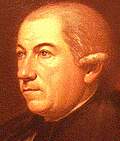| Received his early education in Charleston; went to England to acquire business training with James Crokatt in London (1744-1747); upon his return to North America (1747) began mercantile career; member of the Commons House of Assembly of South Carolina in 1757 and reelected to every session, with one exception, until the Revolution; served as lieutenant colonel in a campaign against the Cherokee Indians (1761); declined appointment to King's Council in Carolina in 1764 and 1768; was embroiled in controversy with Charleston customs officers over seizure of his vessels (1767-1769); toured England, France, the Low Countries and Switzerland (1771-1774); member of the American Philosophical Society, Philadelphia, Pennsylvania, 1772-1792; member of the first and Second Provincial Congress of South Carolina (1775-1776); served as President of the Provincial Congress (1 Jun 1775 - 1 Nov 1775); chairman of the General Committee of Charleston (1775); served as President of the Council of Safety of South Carolina (16 Jun 1775 - 1 Nov 1775 and 30 Nov 1775 - 26 Mar 1776); Vice-President of South Carolina (28 Mar 1776 - 27 Jun 1777); elected a delegate from South Carolina to the Continental Congress (1777-1780); served as the President of Congress (1 Nov 1777 - 9 Dec 1778); during his term, Congress adopted the Articles of Confederation (15 Nov 1777), pending ratification by the individual states; American and French representatives signed two treaties in Paris - a Treaty of Amity and Commerce and a Treaty of Alliance (February 1778); Congress was forced to move to York, Pennsylvania, under the pressure of British troops; Congress returned to Philadelphia on 2 Jul 1778; he tendered his resignation to Congress on 9 Dec 1778 as a result of disagreement with the Congress' resolves regarding appearance of seditious handbills in Pennsylvania with criminal charges against some state officials; resignation accepted by the Congress and election date set up on 10 Dec 1778; elected Minister to Holland by the Congress (21 Oct 1779), and sailed for his post early in 1780; was captured by British troops (3 Sep 1780) on the voyage and held a prisoner in the Tower of London for fifteen months; was released on 31 Dec 1781, in exchange for Lord Cornwallis; appointed one of the peace commissioners and signed the preliminary treaty of Paris on 30 Nov 1782; returned to the United States on 3 Aug 1784, and retired to his plantation, "Mepkin," near Charleston, South Carolina; subsequently elected to the Continental Congress, to the State legislature, and in 1787 to the Federal Constitutional Convention, all of which offices he declined; continued as a planter until his death at "Mepkin". |
| Biographical sources: "The Papers of Henry Laurens" (University of South Carolina Press, 1968-2002), 16 vols.; Biographical Directory of the United States Congress (2005), p. 1423; The State Gazette of South-Carolina, Thursday, December 13, 1792, Volume LV, Number 4,148, p. 3 (obituary). |

